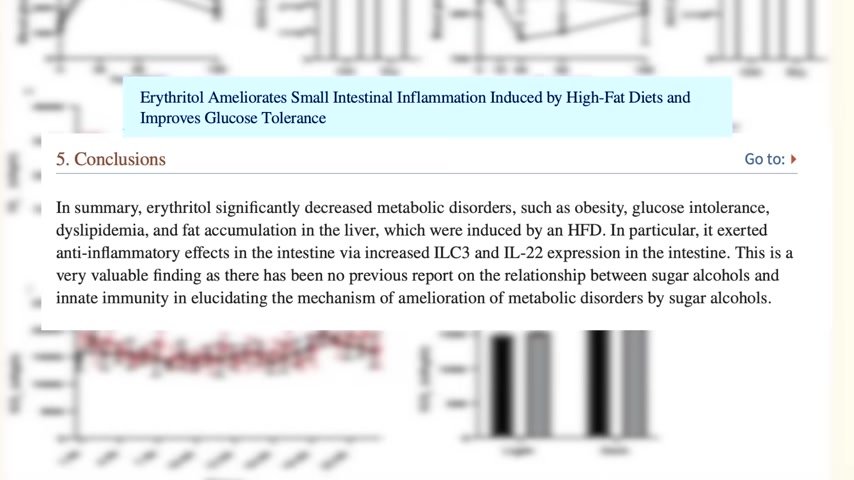Table of Contents
Dr. Berg examines a study linking the sugar alcohol erythritol to increased risk of heart attacks and strokes, providing analysis on correlation vs. causation, erythritol production in the body, and research on potential erythritol benefits.
A recent study has caused a stir by suggesting a link between the sugar substitute erythritol and a higher incidence of heart attacks and strokes. The news has spread rapidly across media outlets and social platforms. However, Dr. Berg wants to take a closer look at this study and highlight some significant issues with its methodology and conclusions.
In this article, Dr. Berg breaks down four key problems with the erythritol study, including the difference between correlation and causation, the study’s failure to measure dietary erythritol intake, the body’s natural production of erythritol under certain conditions, and conflicting research indicating potential benefits of erythritol. With an in-depth analysis, he aims to provide a balanced perspective on whether erythritol is truly the culprit or if other factors may be at play.
Erythritol and heart attacks

Let’s talk about this , fascinating study that was just released . It’s all over the news .
It’s all over social media that erythritol in your blood is now correlated to higher incidence of heart attacks and strokes .
Now when I see something like this all over the news , right , just out of the blue , I wanna know the source of the study , the who’s funding the study , and I’m gonna put some links down below on that topic .
Is erythritol bad?
And if you actually read the study , there are some really interesting , not just red flags , but serious omissions . And I wanna talk about them .
There’s actually 4 points about the study . I’m gonna make it really simple .
I’m not gonna get into the nitty gritty of all the details of the study , but I wanna talk about the 4 big problems with the study .
The first 1 involves this word called correlation .
Understanding Correlation vs. Causation
Correlation refers to something that has a similar association , usually some measurement or number .
It has nothing to do with causation .
So let me just kind of give you an example of correlation .
Statistically , there’s a correlation of 99 point 79% of government spending on science and space technology in the state of Maine , and the number of suicides from hangings .
So if you were to look at that from a causation , you would wanna dramatically reduce the amount of spending in the schools on this technology .
I mean , that’s totally illogical .
Let’s look at another 1 .
There’s a 94.7% correlation between cheese consumption in the United States per person in pounds and people dying from being tangled in bedsheets .

So in other words , there’s a correlated statistical increase between so many years .
And this also correlates between the total amount of revenue generated by skiing facilities in the US .
So you can see these disrelated things have a very similar correlation .
Personally , I think there’s a very high statistical correlation , like it’s probably close to a 100% of information being put out by the news and it being completely false .
The Body’s Production of Erythritol
So point 1 correlation doesn’t mean causation .
This was an observational study , not a very high quality study .

Number 2 , this study was not based on how much erythritol was consumed by people .
It did not measure dietary erythritol at all .
That was not measured in this main study .
What was measured was just the amount of erythritol in the blood that could have come from your body making it .
| Feature | Details | Dr. Berg’s Take |
| What is Erythritol? | A sugar alcohol used as a sugar substitute in low-carb and keto-friendly products. | – Body struggles to metabolize it – Passes through mostly undigested – Doesn’t spike blood sugar or insulin |
| The Study | Found a link between higher erythritol blood levels and increased risk of heart attacks, stroke, and death. | – Confirms his prior concerns about artificial sweeteners |
| Possible Mechanisms | – Erythritol may make platelets stickier, increasing clotting risk. – May disrupt gut bacteria, leading to inflammation. | – Study highlights clotting risk – Emphasizes his view that all artificial sweeteners harm gut health and metabolism, potentially causing more problems long-term |
| Dr. Berg’s Concerns | Focuses on the potential negative impacts of erythritol and other artificial sweeteners. | – Disrupts gut microbiome – Alters blood sugar control mechanisms – May lead to weight gain, insulin resistance, metabolic issues |
| Recommendations | Recommends avoiding erythritol and all artificial sweeteners. | – Choose natural, healthy sweeteners like stevia, monk fruit, or allulose (in moderation) |
Our bodies actually make erythritol .
It’s called endogenous erythritol .
And chances are erythritol is not really that popular .
So this study could basically be just measuring endogenous erythritol , which is the erythritol made by your own body .
Now the 3rd point I wanna bring up will explain number 2 .
Why would your body actually make erythritol in the first place ?
Why would it make high amounts ?

Well , erythritol is produced when you metabolize glucose .
So the more sugar you consume , the more you’re a diabetic .
The more fructose you consume , the more erythritol you’re gonna make .
Erythritol is also made when there’s oxidative stress in the body .
And so it’s made when you have liver disease , kidney disease , diabetes .
It also is increased when you have belly fat , which is correlated probably from the amount of carbs you consume .
It’s also produced when you consume a lot of alcohol .
So that’s an interesting piece of information .
So how can we really know if these cardiovascular , events are caused by the erythritol or by the person’s overall health .
And the other thing you should know about this study , the great majority of the people in this study had high blood pressure , had diabetes .
They were in very , very poor health .
Just something you should know .
number 4 , and this is the icing on the cake .
If you look up research on Erythritol , okay , you’re gonna find some really interesting counter information
Erythritol apparently is an antioxidant .
It has anti inflammatory properties .
It has the potential to lower A1C , blood glucose , improve insulin resistance .

It has the ability to increase insulin sensitivity , It apparently in 1 study show that it improved endothelial function and can decrease the aortic stiffness and apparently can even slow down weight gain in my studies that were fed a high fat diet .
That’s very interesting .
Could it possibly be that erythritol is increasing to counter the bad effects of sugar creating oxidative stress and lowering inflammation .
Is that a possibility ?
So , apparently , if you align all of this data together , it sounds to me that it’s definitely more likely something that’s trying to help you than something that’s trying to hurt you .
So , you know , honestly , I just I don’t like doing these topicsbecause it’s kind of a reaction to something in the news , which is kind of a distraction from other topics that I really want to talk about , on a daily basis in my topics.
But I just wanted to give you a summary on this , so you have all the information .
So you personally can make up your own mind on whether , erythritol is is the bad guy or possibly even the good guy .
Now check this part out .

This is extracted from the conclusion of 1 of the studies talking about erythritol .
It says this , in summary , erythritol significantly decrease metabolic disorders such as obesity , glucose intolerance , dyslipidemia , which is a kind of a dysfunction of your lipids and fats , and fat accumulation in the liver , which were induced by a high fat diet .
In particular , it exerted anti inflammatory effects in the intestine .
This study was done in mice , but still it showed that there’s actually a benefit of taking Erythritol .
Now since we’re sort of on the topic of cardiovascular events
Summary
- Correlation does not imply causation. Just because two factors are correlated does not mean one causes the other. This was an observational study, not a high quality experimental study.
- The study did not measure dietary intake of erythritol. It only examined endogenous erythritol levels in the blood, which the body naturally produces.
- Endogenous erythritol is formed when the body metabolizes glucose and experiences oxidative stress, as seen with diabetes, fatty liver, alcohol use, etc. Higher levels could simply indicate underlying health problems rather than erythritol itself being problematic.
- Most study participants had conditions like high blood pressure and diabetes, making it difficult to attribute any effects solely to erythritol intake.
- Research finds erythritol may act as an antioxidant and anti-inflammatory. It could lower blood sugar and insulin resistance, as well as weight gain. This suggests it functions protectively in the body.
- The study did not establish erythritol as the direct cause of cardiovascular events. When considering all factors, erythritol seems to be more of an adaptive response than a harmful substance. More high-quality research is still needed.
key Points
- A new study on erythritol and heart attacks has been in the news and found its way to social media—let’s talk about it.
- This study correlates erythritol in your blood to higher incidents of heart attacks and strokes. However, I see some serious problems with this study.
Here are four key points about this study:
- Correlation does not mean causation.
- This study was based on endogenous erythritol and did not measure dietary erythritol. The body makes endogenous erythritol.
- The body produces erythritol when you metabolize sugar, have oxidative stress or belly fat, or consume alcohol. The great majority of people in this study were in poor health, so how do we know erythritol was the problem?
- Other research has liked erythritol to many different health benefits.
Could it be that erythritol is increasing in the body to counter the bad effects of sugar? It seems to me that erythritol is something that’s trying to help you and not hurt you.
DATA
https://www.ncbi.nlm.nih.gov/pmc/articles/PMC8197374
https://www.ncbi.nlm.nih.gov/pmc/articles/PMC6574164
https://www.sciencedirect.com/science/article/abs/pii/S0273230096901129
https://www.sciencedirect.com/science/article/abs/pii/S0899900709002275
FAQ
What is the truth about erythritol?
The truth about erythritol is that recent studies have found an association between higher blood levels of erythritol and an increased risk of heart attacks and strokes. [1][2][4] Erythritol is a common artificial sweetener used in many low-calorie and sugar-free products. While the FDA considers erythritol safe, the quantities used in processed foods may be much higher than what is naturally found and known to be safe. [4] More research is still needed to confirm if erythritol directly causes these cardiovascular issues or is just correlated with them. [4]
What sugar is linked to heart attack and stroke?
The recent studies have found that higher blood levels of the artificial sweetener erythritol, not regular sugar, are associated with an increased risk of heart attacks and strokes. [1][2][4] Erythritol is a sugar alcohol that is often used as a replacement for table sugar in low-calorie and low-sugar products. The research suggests erythritol, not regular sugar, may be the culprit behind the increased cardiovascular risks. [1][2][4]
Are artificial sweeteners linked to heart attacks?
Yes, some research has found a link between certain artificial sweeteners, including erythritol, and an increased risk of heart attacks and strokes. A recent study showed that people with higher blood levels of erythritol were about twice as likely to experience a major adverse cardiovascular event over a 3-year period compared to those with lower erythritol levels. [1][2][4] This association was seen even after accounting for other known heart disease risk factors. More research is still needed to confirm if erythritol directly causes these cardiovascular issues.
What sweetener is linked to strokes?
The artificial sweetener erythritol has been linked to an increased risk of strokes in recent studies. Researchers found that people with higher blood levels of erythritol had about double the risk of experiencing a stroke or heart attack compared to those with lower erythritol levels. [1][2][4] This association held true even after accounting for other known risk factors for cardiovascular disease. While more research is needed, these findings suggest erythritol may be a hidden contributor to heart disease and stroke risk.
Erythritol study debunked
There is no evidence that the recent studies linking erythritol to increased cardiovascular risks have been debunked. The research, published in the prestigious journal Nature Medicine, examined data from over 4,000 participants across multiple studies and consistently found the association between higher erythritol levels and greater risk of heart attacks and strokes. [1][2][4] While more research is still needed to confirm causation, the current evidence has not been refuted or debunked by the scientific community.
How much erythritol is too much?
There is no established safe upper limit for erythritol consumption, as more research is still needed. However, the recent studies found that people in the top 25% of erythritol blood levels had about double the risk of heart attacks and strokes compared to those in the bottom 25%. [1][2][4] This suggests that consuming large amounts of erythritol, likely from frequent use of erythritol-containing processed foods and beverages, may be problematic for cardiovascular health. Moderation is likely advisable until further safety studies are conducted.
Erythritol vs stevia
Erythritol and stevia are both non-nutritive sweeteners, but they differ in important ways. Erythritol is a sugar alcohol that has been linked to increased cardiovascular risks in recent studies. [1][2][4] In contrast, stevia is a natural, plant-based sweetener that does not appear to have the same concerning health effects. While more research is still needed, current evidence suggests stevia may be a safer alternative to erythritol. [3][5]
Erythritol heart palpitations
There is no direct evidence linking erythritol consumption to heart palpitations. The recent studies found an association between higher erythritol blood levels and increased risk of heart attacks and strokes, but did not specifically examine heart palpitations. [1][2][4] Heart palpitations can have many potential causes, and more research would be needed to determine if erythritol could be a contributing factor. If you experience persistent heart palpitations, it’s best to consult with your healthcare provider.
Stevia without Erythritol
Stevia is a natural, plant-based sweetener that does not contain erythritol. Many stevia-based sweetener products, such as Truvia and Splenda Naturals Stevia, are blended with erythritol to improve the taste and texture. However, you can find pure stevia extracts and stevia-based sweeteners that do not contain any erythritol. These may be a safer option compared to sweeteners that combine stevia with erythritol, given the potential cardiovascular risks associated with erythritol. [3][5]
Monk Fruit without erythritol
Monk fruit sweeteners are another natural, zero-calorie alternative to sugar that does not contain erythritol. Monk fruit extract is the main sweetening ingredient in these products, without the addition of erythritol or other sugar alcohols. For those looking to avoid erythritol, monk fruit sweeteners may be a suitable option, as they do not appear to carry the same cardiovascular health concerns. [3][5]
What are the dangers of erythritol?
The main danger of erythritol, based on recent research, is its potential link to an increased risk of heart attacks and strokes. Studies have found that people with higher blood levels of erythritol had about double the risk of experiencing a major adverse cardiovascular event compared to those with lower erythritol levels. [1][2][4] The mechanism appears to be that erythritol may increase the tendency of blood platelets to clot, potentially leading to blockages in the arteries. More research is still needed, but these findings suggest erythritol may be a hidden contributor to heart disease risk. [1][2][4]
Best sweetener for heart patients
For heart patients or those at risk of cardiovascular disease, the best sweetener options may be natural, non-nutritive sweeteners that do not appear to carry the same health concerns as erythritol. These include stevia and monk fruit sweeteners, which are plant-based and do not seem to be associated with increased heart attack or stroke risk based on current evidence. [3][5] Moderation is still advised, but these may be safer alternatives compared to erythritol-containing sweeteners. Consulting with a healthcare provider is recommended to determine the best sweetening approach for individual needs.




